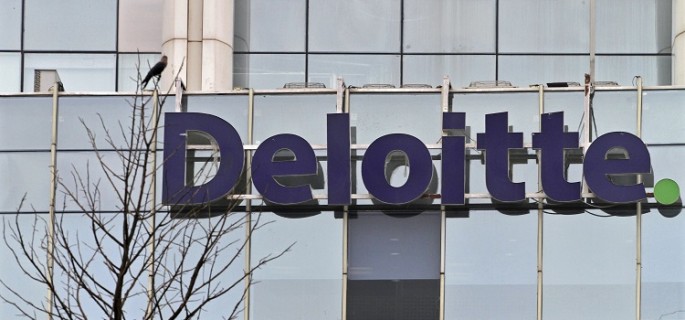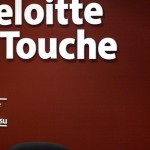How Deloitte squeezes millions out of UK Government

They say a week is a long time in politics – in which case six months locked out of Whitehall could seem like an eternity.
That will certainly be the case for Deloitte, the accountancy giant which is used to taking vast streams of income from the Government, but which this week had to accept a half-year ban on getting new contracts.
It may irk David Sproul, the £2.8million a year boss of Deloitte – but will it really harm the firm?
After all, this is a group that has survived toxic ties to Sir Fred Goodwin, the MG Rover scandal and even a lawsuit over its audit of a bank that funnelled money to drug barons and Hezbollah.
It will take a lot to put the brakes on Deloitte’s fee machine.
It raked in a record £3billion of revenues last year, more than £824million of it from audits – it checks the books for around one in four FTSE 100 firms. Its partners made an average of £837,000 each last year.
The latest embarrassment was caused by senior partner Keith Leslie, who penned a memo claiming divisions in the Cabinet were undermining preparations to leave the EU.
It suggested the Government would need to hire an extra 30,000 civil servants to handle Brexit.
How embarrassing, particularly as the top man, Sproul, was vocally pro-Remain, and because Deloitte made millions of euros out of the EU last year.
According to Christian Stensrud, a research fellow at thinktank Civitas, Deloitte was involved in €45million of EU auditing and consulting in 2015, making at least €24million.
Brexit might mean some of that dries up. But Deloitte is ideally placed to make money anyway, not least by offering advice to worried clients whose fears it helped stoke in the first place.
Some may find that hypocritical. But in the world of the big accountancy firms, profits come way ahead of principles.
Deloitte is at the centre of a nexus of elites that dominates British business. Far from being a bunch of crumple-suited number crunchers, their sleek City partners play an important but largely unscrutinised role in national life.
Their hidden hand exerts an influence over everything from banking to tax policy to Brexit – and that influence is not always benign.
Worse, thanks to ineffective regulation and a misguided view they are too boring to do any harm, Deloitte and its rivals are rarely called upon to answer for their conduct, so they ply their self-serving agendas with impunity.
Prem Sikka, professor of accounting at Essex University says they are guilty of duplicity.
He says: ‘Even if the top accountants opposed Brexit, they still see it as a rich source of income. It is sheer hypocrisy. The firms are looking to shape Brexit policy to their own ends, on areas such as tax. They will cash in on a post-Brexit world.’
Indeed. Deloitte sponsored the relentlessly pro-Remain CBI’s conference this year. Critics say the relationship between the Government and Deloitte and its fellows is far too close.
‘The accountancy firms have far too many tentacles,’ says author and financial expert Ian Fraser.
‘They inveigle themselves into the policymaking process through secondments, by writing reports and memos, offering free services to both the Government and to the Opposition, and of course the revolving door of appointments.’
Deloitte was guilty of one of the worst instances of this when it took on former top taxman Dave Hartnett as a consultant in 2013, only ten months after he retired from HMRC, where he had been widely criticised for doing ‘sweetheart deals’.
These allowed the likes of Starbucks and Vodafone – then audited by Deloitte – to avoid millions in payments to the public purse.
In fairness to Deloitte, it was not the only offender. The committee of MPs who investigated the role of the large accountancy firms in tax avoidance three years ago found all were too cosy with the Government.
The chummy relationship, they said, ‘creates a perception’ that the firms ‘wield undue influence on the tax system that they use to their own advantage’.
Even more unfortunate was the firm’s chumminess with Goodwin, an old boy of Deloitte. Goodwin qualified as a chartered accountant in the early 1980s at Touche Ross, which later merged with Deloitte.
One of his first acts when he became chief executive of RBS in 2000 was to appoint his former employer to audit the bank. This was to prove highly lucrative for Deloitte. In 2007 alone, the year before the bank’s collapse, it received more than £31million.
Its supposedly eagle-eyed personnel, however, did not issue any warnings of the lender’s imminent collapse.
‘The RBS accounts for 2007 have since been proven to be wildly inaccurate,’ says Fraser, author of Shredded: Inside RBS, The Bank That Broke Britain.
‘The lack of professional scepticism with which Deloitte audited the bank was breathtaking.’
Deloitte said it is confident it fulfilled its responsibilities as an auditor of RBS and satisfied that its work was thorough.
But its experts are often found wanting. David Sproul, to take just one example, delivered doom-laden forecasts on Brexit, predicting that there would be a slowdown in the economy in the second half of this year. In fact the UK outperformed many other developed economies.
Aside from the RBS nightmare, Deloitte’s worst botch-up was at the collapsed car maker MG Rover.
The Midlands car firm went into administration in 2005 with debts of £1.4billion and more than 6,000 job losses, five years after being bought by a group of entrepreneurs known as the Phoenix Four for a token £10.
Deloitte was fined a record £14million in 2013 over conflicts of interest because it simultaneously acted for the car company and for the Phoenix Four, who made millions from the deal. The penalty was reduced to £3million two years later.
Whatever Deloitte’s shortcomings, its well-paid partners can be sure of one thing: the punishment will never be too harsh.
The Big Four accountants have a stranglehold on auditing Britain’s top companies, and therefore the Government cannot afford to let any of them go out of business.
So you can expect Deloitte to continue to rake in fat fees, and for its City partners to carry on drawing their six-figure salaries, safe in the knowledge that no-one is likely to call them to account.
Source: This is Money




























